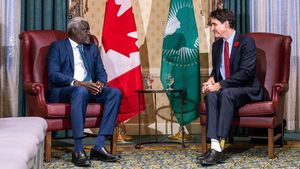Recent tensions between Iran and Israel have reached alarming levels, with speculation mounting over Iran's potential retaliation for Israel's military actions. This situation escalated dramatically following Israel's confirmation of strikes against Iranian military sites on October 26, 2024.
The conflict has deep roots, with Iran’s military involvement and its backing of various militant groups adding complexity to the region's already volatile dynamics. On October 1, Iranian forces reportedly launched missile strikes against Israel, which they framed as retaliation for the assassination of their leaders and members of the Revolutionary Guard. This exchange of hostilities has ignited fears of broader military escalation.
Kata’ib Hezbollah, one of the key Iranian-backed militant groups operating within Iraq, recently made headlines. They emphatically denied claims circulated by U.S. and Israeli officials stating Iran intended to launch retaliatory attacks from Iraqi soil. They labeled such reports as “misleading information” largely aimed at swaying American and Western public opinion and justifying potential military actions against Iraq.
According to the group's representatives, they maintain strict criteria for any defensive action and asserted they had not received any requests for support from Iran concerning retaliation efforts. This assertion raises questions about Iran's ability to coordinate military responses through allied groups like Kata’ib Hezbollah.
The Iraqi government's National Security Council reiterated its position, firmly denying any claims of Iranian operations planning from Iraq. General Yahya Rasool, spokesperson for the Iraqi military, stated such narratives serve as justifications for possible Israeli assaults on Iraqi territory.
Reports of U.S. officials warning Iraq to prevent Iranian attacks from its territory have caused tensions. U.S. military circles have suggested Iran might amass up to 200 missiles on Iraqi soil to execute targeted strikes against Israel. These developments evoke serious concerns about escalation, particularly if military actions are conducted against U.S. interests or personnel stationed within Iraq.
Both Washington and Jerusalem are increasingly apprehensive about Iran's military capabilities and strategies. Some analysts point out the possibility of Iran conducting strikes from multiple fronts, including Iraq and Yemen, raising the stakes significantly.
Among several diplomatic figures and experts analyzing this tension, there is widespread speculation on how best Iran can retaliate without triggering stricter responses from Israel and its allies. Daniel DePetris, writing for Twin Cities, emphasizes the precarious position Iran finds itself in, needing to demonstrate its strength to its domestic audience but also carefully weighing the repercussions of military action.
Despite this, Hezbollah's recent missile barrage targeting Israeli military sites indicates Iran's willingness to respond decisively when provoked, even from different locales. By employing proxies like Hezbollah, Iran can pursue its agenda without directly involving its own military forces, thereby minimizing risks of retaliation against its own territory.
Experts assert Iran is likely to rely on its network of militias across the region and leverage their capabilities against Israel, potentially complicity involving groups operating out of Lebanon, Syria, and Yemen. This network presents Iran with multiple pathways for retaliation, which could include cyber-attacks, missile strikes, and conventional military engagements.
The situation remains delicate as Iran navigates its retaliatory options amid fears of provoking larger-scale conflict. The ambiguity surrounding military actions across the region amplifies the risk of miscalculations, underscoring the urgent need for diplomatic interventions and conflict resolution initiatives.
While the dialogue between Iran and Israel appears more polarized than ever, the underlying realities of military preparedness and response capacity will continue to influence the outcomes of this fraught conflict. The international community watches closely, aware of the significant ramifications should hostilities escalate beyond current skirmishes.
Observers urge for de-escalation measures to prevent unintended fatal confrontations, highlighting the need for direct communication between involved nations and allied groups. Without proactive efforts, tensions between Israel and Iran may lead to an unforeseen regional crisis, exacerbated by entangled interests and alliances.



